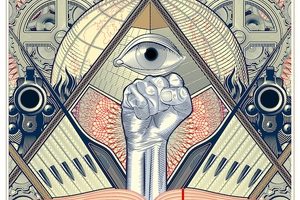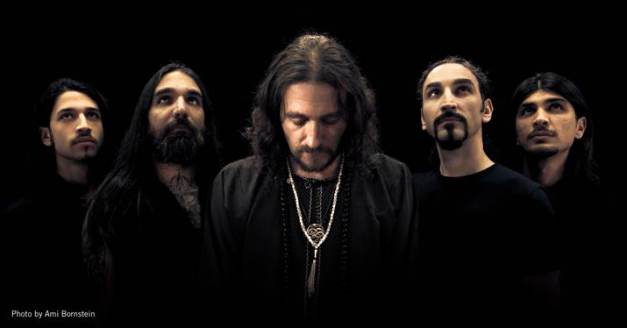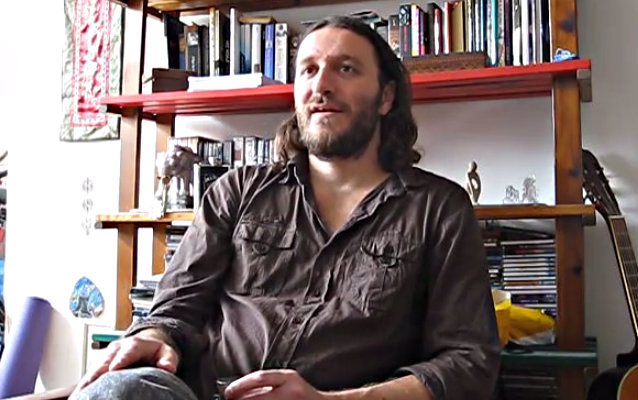Orphaned Land – Bringing Hope to the Hopeless
Tuesday, 9th January 2018
Since their early days, Israel’s Orphaned Land have brought a distinctly unique sound to the progressive metal realm. Combining strong musicianship, Middle Eastern instrumentation and flair, as well as thought-provoking and intelligent lyrical content, it’s no surprise that they quickly became revered within the metal scene. They’ve gained ground with each new release, but their achievements aren’t relegated to simply musical in nature. Due to their afore-mentioned lyrical content and willingness to tackle some tough issues, they are frequently looked to as bringers of hope within the metal scene (and even outside of it).
As a band that certainly takes time and care with each release (it’s been 5 years since their last effort, All is One), it makes each new release more of an event than those who bring forth new material every year or two. But it also means there are greater expectations, and the soon-to-be-released Unsung Prophets & Dead Messiahs does not disappoint. Expansive material that mixes what has worked for the band in the past, while furthering their sound and direction. We were able to chat with vocalist Kobi Farhi about this latest effort, in terms of its meaning and origins, as well as metal’s unity and ability to bring hope, alongside some of the problems of the world of today (and a glimpse at what we can do to help solve them).
Dead Rhetoric: What does Unsung Prophets & Dead Messiahs bring to the table for Orphaned Land?
Kobi Farhi: I think that on a musical level, it’s like a new progression for the band. If you take the last three albums – Mabool, [The Never Ending Way of] ORwarriOR….those were conceptual, progressive albums, where All is One was a much more straight-forward album. I think that we took all three and made a combination between them. We are back to a concept album, but we used the production, epicness, arrangement, and orchestra that we used on All is One. On a musical level, it’s the perfect formula for us, and we believe that it is, musically, our best album to date.
On a conceptual level, it’s a very deep subject that we have found. It deals with the Allegory of the Cave by Plato. Plato was a great philosopher and wrote the Allegory of the Cave after the Greeks decided to kill Socrates. He couldn’t realize how humanity could let go of such a human being – he was the light…someone who could give guidance to the people. The allegory is to human behavior. He said that human beings are being born in a cave, chained with both hands and their head is against the wall. There’s a fire behind them, so everything they see on the wall is just shadows. Those shadows are the absolute truth – they were born in this cave, and those shadows are all that they see. One day, a guy gets out of the cave and sees the world – he steps out of his shadow and sees the real thing. He sees the sky, the clouds, everything. The first thing he does is come back to the cave and he wants to save everyone in the cave. He tells them about the world outside of the cave and they think that he has lost his mind and they kill him.
This is what they did to Socrates, but it’s also what happens to many revolutionaries throughout history. If you take Jesus Christ – he was a rebel and ended up on the cross. If you take Martin Luther King Jr, or JFK – anyone who tries to change something in the system, they always end up being assassinated. Take Mahatma Gandhi – he was assassinated. Or the prime minister Yitzhak Rabin from Israel – one of the people closest to getting peace in the Middle East. The first Arab president that ever did peace with Israel – he was also assassinated. So there is a pattern here. Plato wrote that allegory thousands of years ago, so that was some kind of a prophecy…he is an unsung prophet, in the manner of the album title. Those dead people, they are the dead messiahs. Martin Luther King – he was like a messiah to his own people.
In a way, this comes to show us something about human behaviors. Something about the fact that we always prefer to stay in the dark. Better the devil we know, as they say. You don’t want to leave that place. So this is a concept album that touches those subjects. Albert Einstein once said that the world will not be destroyed by those that do evil, but those that do nothing about it. This is the point – the majority of the people aren’t evil, but they’ve done nothing about everything evil that is going on.
Dead Rhetoric: In that sense, with the way that the world has been shifting, even in the last few years. There’s the pattern over the longer scale of time as you just mentioned, but do you feel it’s also a timely album considering everything happening around us?
Farhi: Definitely. We have always been dealing with actual problems – we have usually dealt with the Middle East, but this time everything is much more global. I think the global situation of the world is very bad. I keep wondering again and again how it could be that humanity is so innovative and advanced with technology, science, and agriculture yet between human beings we are always destined to repeat our mistakes throughout history. It seems like we are trapped in this loop of doing the same mistake again and again. We cease to produce better leaders, and if we do produce them, they always end up dead…like the one’s I mentioned.
It’s very interesting because we are so advanced in many other places, while between ourselves, we progress a bit and then go back. It feels like today, with Trump, North Korea, Russia, the Middle East – everything seems to be so explosive. This is after all the experiences we’ve had throughout history. It doesn’t matter, and it feels like something very bad is going to happen. It’s something we should question ourselves. These are bad times, and the question is “Why can’t we learn?” Plato wrote that allegory thousands of years ago. Why has no one learned from this? Why are we dealing with gossip newspapers or reality TV or the ass of Kim Kardashian, and not about the important things to create a better humanity? If you take Kim Kardashian, Justin Bieber, or any other celebrity culture…the fact that people are dealing things like Kanye West wearing a red jacket. If people are dealing with these subjects, these are the shadows of the Cave of Plato. Your shadow is nothing, it’s just your shadow. They deal with those things as if they are the most important things in the world.
Dead Rhetoric: I can’t help but just agree. I’m a science teacher, and these are the same things I feel like I try to spread every year in that regard. It’s crazy how we just keep repeating ourselves, and we don’t want to progress.
Farhi: You said that you are a teacher – I think that you are privileged to work in one of the most important professions out there. I honestly think the key for any kind of change, or any way out of this loop – it will always come through the education system. I think that if you rewrite the education system, it will be the only way we can change anything.
Look at the way we grow up – the first toys that our parents buy us are toy guns. We are standing in front of a screen, and we need to kill everyone on that screen. Only by doing that do we go to the next level of the game. Its violence being planted in our brain – violence is acceptable in our brain from the age of 5, when you hold that toy gun in your hand. Of course, with kids today – they want to be famous. Some kids a few days ago were asking me, “Kobi, are you famous?” I told them that I’m an artist and people appreciate my art. So then they answered, “But, are you famous?” I think this is a part of the problem today – it’s all about fame. It’s all about “Are you famous or not?” Kim Kardashian is famous for what? For nothing. She didn’t write anything, she didn’t say anything. Her point of view on something is not so outstanding. It’s just nothing. It’s like The Nothing from The Never-Ending Story. It’s just that. It really worries me.
But the key is education. If you re-write it, and you put more effort into human behavior. If you teach children about yoga, about a dialogue, about values – they know what is nothing and what is worth something. I think we will eventually come to a situation where we will produce better people who will come to lead us. I think that people can complain about Trump all day long, but Trump is a mirror to who we are. People elected him. He was suggested by his party. People went to vote, and that’s what happened. It’s the system. There was nothing here made out of a revolution, or some dictatorship – he just won. He won because he is a mirror of who we are. That’s something that we should acknowledge and something we should know. It’s all about better education. Better education will produce better human beings; that is all.
Dead Rhetoric: That’s perfectly said. Jumping back to the album itself, could you talk about the video that was released for “Like Orpheus?”
Farhi: In the manner of the concept of the album, it’s when the hero of the story leaves the cave for the first time and he sees the world outside. He describes it with singing. In Greek mythology, Orpheus was a character, that when he sang, even the clouds, earth, stones…everything likes the way he sings. So I wanted to use the expression ‘like Orpheus,’ because when he was out of the cave, he was singing like Orpheus. And when I had to think of someone that sings like Orpheus, Hansi Kürsch of Blind Guardian came to mind. I thought he could be my Orpheus in this album – I wanted someone else to sing it instead of me. It was great to have him.
In the clip, we thought we should reflect more visuals to the world, and share visuals about metal fans in the Middle East. You guys are living in the States – I thought it would be interesting for you to see the life of metalheads in the Middle East. Metal in the Middle East is still considered Satanism in many countries. It’s considered blasphemy in the Arab world. But there are thousands of people who like metal. We have thousands of fans in the Middle East, including Arabs. We are Israelis, which makes the whole thing a little crazy.
We wanted people to see a glimpse of that double life that these people are having. They have their orthodox life, and then they change and go to a Kreator show. The amazing thing, and the message – at the end of the clip you see both of the characters sitting at the bus station in their traditional clothes, and they have no idea that they are so similar. They have no idea that they both were at the Kreator show. They don’t know that they are both metalheads. That, in a way, is the Cave of Plato. We judge by the custom, the cultural outfits, and this is also some kind of a cave. We loved to reflect and touch all those subjects in the video clip. We thought it would be much more interesting rather than to hold guitars, headbang our asses off, and have that crazy footage of ourselves being on a cliff and doing that.
Dead Rhetoric: So what do you feel gives metal the power to unify?
Farhi: I think that there is something very sincere with metal music. The metal community is one of the best coexisting communities out there. Of course, you can put aside the Norwegian scene that burned churches, but if you take the majority of metalheads, they always coexist. They don’t care. If you are a metalhead, and I’m a metalhead, we don’t care about our backgrounds…we are just united by loving metal music. I think that I heard that feeling for the first time when I heard Iron Maiden when I was 15. I felt something very sincere – something uncompromised…not trying to be radio-friendly or trying to be too pop-ish. If you ask me, I always thought that pop music was much more diabolical than metal music [laughs].
Anyway, I think that metal is very sincere. I think that metal fans always give a lot of attention to the artwork, the lyrics, and a dressing code for metal people. I think that metal is very similar to religion in many ways, if you put dogma aside. The dress code – you can see a metalhead from miles away. You aren’t going to see someone who loves jazz from miles away – there’s something special about that community. I like that sincerity, and those bands. I always thought metal fans were more coexisting, because you don’t hear about say, gang fights or stabbings at festivals. Of course, there are assholes everywhere but comparing them to other scenes, [metal] is one of the most peaceful scenes out there. I admire metal people for that.
Pages: 1 2



























